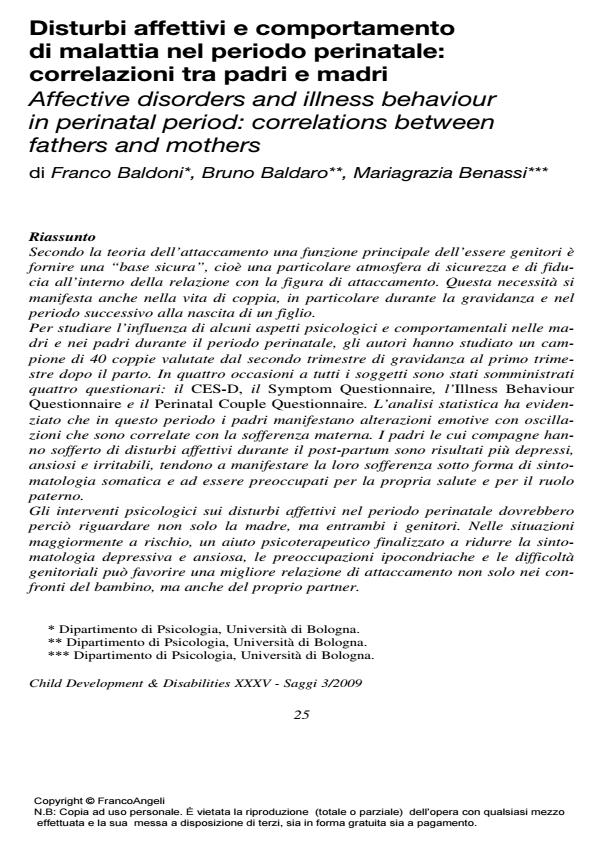Affective disorders and illness behaviour in perinatal period: correlations between fathers and mothers
Journal title CHILD DEVELOPMENT & DISABILITIES - SAGGI
Author/s Franco Baldoni, Bruno Baldaro, Mariagrazia Benassi
Publishing Year 2010 Issue 2009/3
Language Italian Pages 20 P. 25-44 File size 633 KB
DOI 10.3280/CDD2009-003002
DOI is like a bar code for intellectual property: to have more infomation
click here
Below, you can see the article first page
If you want to buy this article in PDF format, you can do it, following the instructions to buy download credits

FrancoAngeli is member of Publishers International Linking Association, Inc (PILA), a not-for-profit association which run the CrossRef service enabling links to and from online scholarly content.
Following attachment theory, a main function of being a parent is to supply a "secure base", i.e. a particular feeling of safety and trust in an attachment relationship. This necessity is also a characteristic of adult age and is evident in couple life and, in particular, during pregnancy and in the period following the birth of a child. To better understand the effects of some psychological and behavioural factors in mothers and fathers during the perinatal period, the authors studied a sample of 40 couples evaluated from the second trimester of pregnancy to the first trimester after delivery. On four occasions all the subjects were asked to fill out four questionnaires: the CES-D, the Symptom Questionnaire, the Illness Behaviour Questionnaire and a Perinatal Couple Questionnaire. Statistical analysis underlined that during pregnancy up to the puerperium fathers suffer from emotional alterations with oscillations that are correlated with the maternal suffering. The fathers whose partners have been diagnosed with an affective alteration during post-partum (maternity blues or post-partum depression) are more anxious, depressed and irritable. They tend to manifest their suffering with somatic symptoms and to worry about their health condition and paternal role. Psychological interventions in the affective troubles during pregnancy and puerperium would therefore concern not only the mother but also both parents. In at-risk situations, a psychotherapeutic aid enabling depressive and anxious symptomatology, hypochondriac worry and relational or parental difficulties to be reduced can promote a more adequate attachment relationship, not only to the child, but also to the partner.
Keywords: Parents, family, fathers, attachment, illness behavior, post-partum depression
- Il padre ritrovato: aspetti antropologici e psiconeuroendocrini della nuova paternità Franco Baldoni, in PNEI REVIEW 1/2024 pp.37
DOI: 10.3280/PNEI2024-001004 - Being the Father of a Preterm-Born Child: Contemporary Research and Recommendations for NICU Staff Franco Baldoni, Gina Ancora, Jos M. Latour, in Frontiers in Pediatrics 724992/2021
DOI: 10.3389/fped.2021.724992 - Depressione materna e paterna: fattori di rischio e di protezione nella genitorialità Grazia Terrone, Alessandro Musetti, Simona Di Folco, Rocco Filipponeri Pergola, in MALTRATTAMENTO E ABUSO ALL'INFANZIA 1/2017 pp.105
DOI: 10.3280/MAL2017-001007
Franco Baldoni, Bruno Baldaro, Mariagrazia Benassi, Disturbi affettivi e comportamento di malattia nel periodo perinatale: correlazioni tra padri e madri in "CHILD DEVELOPMENT & DISABILITIES - SAGGI" 3/2009, pp 25-44, DOI: 10.3280/CDD2009-003002